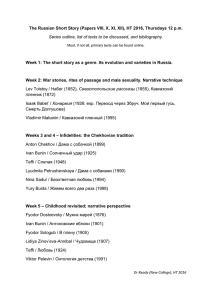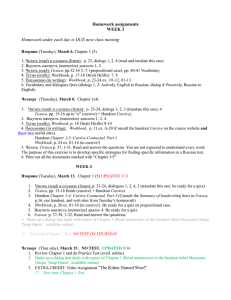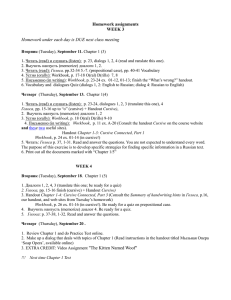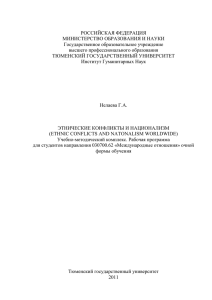Русская Поэзия - LuchSveta.org
advertisement
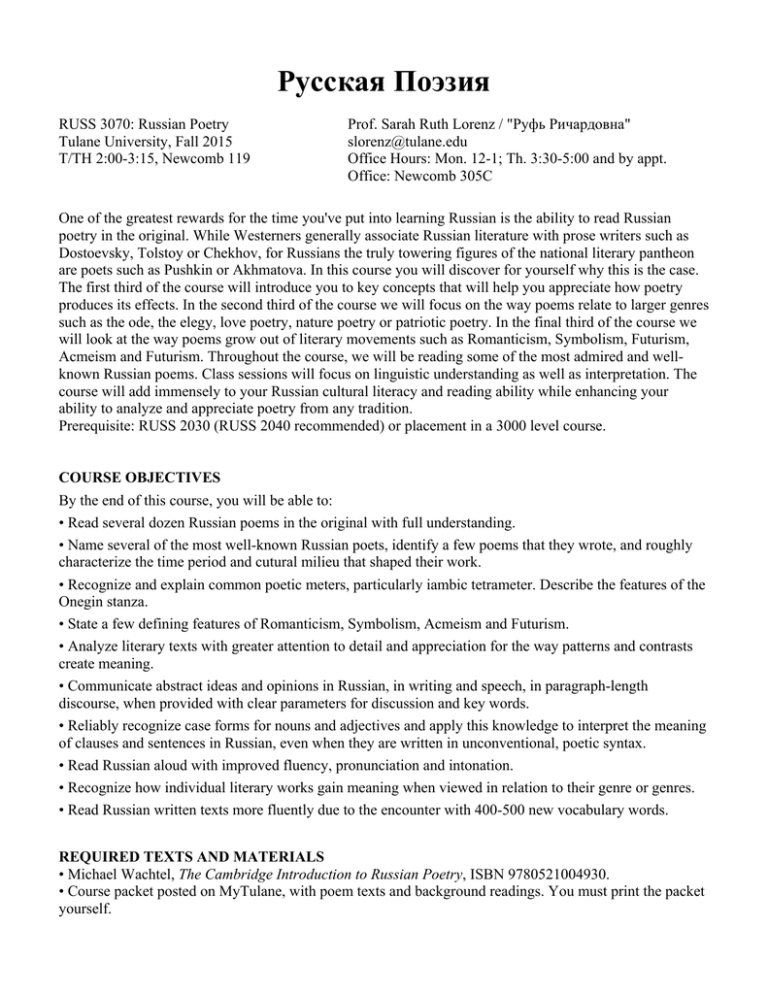
Русская Поэзия RUSS 3070: Russian Poetry Tulane University, Fall 2015 T/TH 2:00-3:15, Newcomb 119 Prof. Sarah Ruth Lorenz / "Руфь Ричардовна" slorenz@tulane.edu Office Hours: Mon. 12-1; Th. 3:30-5:00 and by appt. Office: Newcomb 305C One of the greatest rewards for the time you've put into learning Russian is the ability to read Russian poetry in the original. While Westerners generally associate Russian literature with prose writers such as Dostoevsky, Tolstoy or Chekhov, for Russians the truly towering figures of the national literary pantheon are poets such as Pushkin or Akhmatova. In this course you will discover for yourself why this is the case. The first third of the course will introduce you to key concepts that will help you appreciate how poetry produces its effects. In the second third of the course we will focus on the way poems relate to larger genres such as the ode, the elegy, love poetry, nature poetry or patriotic poetry. In the final third of the course we will look at the way poems grow out of literary movements such as Romanticism, Symbolism, Futurism, Acmeism and Futurism. Throughout the course, we will be reading some of the most admired and wellknown Russian poems. Class sessions will focus on linguistic understanding as well as interpretation. The course will add immensely to your Russian cultural literacy and reading ability while enhancing your ability to analyze and appreciate poetry from any tradition. Prerequisite: RUSS 2030 (RUSS 2040 recommended) or placement in a 3000 level course. COURSE OBJECTIVES By the end of this course, you will be able to: • Read several dozen Russian poems in the original with full understanding. • Name several of the most well-known Russian poets, identify a few poems that they wrote, and roughly characterize the time period and cutural milieu that shaped their work. • Recognize and explain common poetic meters, particularly iambic tetrameter. Describe the features of the Onegin stanza. • State a few defining features of Romanticism, Symbolism, Acmeism and Futurism. • Analyze literary texts with greater attention to detail and appreciation for the way patterns and contrasts create meaning. • Communicate abstract ideas and opinions in Russian, in writing and speech, in paragraph-length discourse, when provided with clear parameters for discussion and key words. • Reliably recognize case forms for nouns and adjectives and apply this knowledge to interpret the meaning of clauses and sentences in Russian, even when they are written in unconventional, poetic syntax. • Read Russian aloud with improved fluency, pronunciation and intonation. • Recognize how individual literary works gain meaning when viewed in relation to their genre or genres. • Read Russian written texts more fluently due to the encounter with 400-500 new vocabulary words. REQUIRED TEXTS AND MATERIALS • Michael Wachtel, The Cambridge Introduction to Russian Poetry, ISBN 9780521004930. • Course packet posted on MyTulane, with poem texts and background readings. You must print the packet yourself. COURSE POLICIES AND ASSIGNMENTS • Your attendance grade will be calculated as a percentage of the days you attended class and arrived on time. Multiple late arrivals will count as an absence. It’s a good idea to notify me about any conflicts. In special circumstances, some absences can be excused. • With the exception of a few technical topics, the majority of the class will be conducted in Russian, including both mini-lectures and class discussion. The portions of class lecture that you are responsible for will be presented in writing, and with emphasis, repetition and rephrasing. During class discussion, it will be challenging for you to express yourself in Russian, but this challenge is an essential part of your language development. Accept that you may not understand everything said in class and may struggle to express some of your ideas. You should view this as an interesting and hopefully enjoyable challenge and as an opportunity to improve your speaking and listening abilities in Russian. Aim to contribute something, at least a small comment, to class discussion every day. Your participation grade will be calculated as a percentage of the days on which you said something in class. • Some of the poems we cover will have translations provided. Use the translation as an aide to your reading of the Russian original. Look up unfamiliar words, identify cases and verb forms, and come to class having worked through the Russian text as best you can. On quizzes and exams, you will be expected to be able to read and translate the Russian text of the main poems covered in class. The instructor will let you know which poems you will be responsible for and which vocab words you may be tested on. Quizzes and exams will include some vocabulary words drawn from the poems, some translation of texts we have previously covered in class, some metrical analysis and some short answers on cultural topics. • For the "oral recitation" assignment, you will read three poems aloud to the instructor, focusing on fluency, intonation and pronunciation. If you memorize a poem, you will receive extra credit. GRADING To pass the course, you must attend and participate in class regularly and hand in all assignments. Quiz 1 / Quiz 2 10% (5% each) Attendance: 10% Midterm: 14% Participation: 10% Final: 24% Mini-essays: 24% (8% each) Oral Recitation: 6% Meter assignment: 2% ACADEMIC INTEGRITY You are responsible for knowing and following the Tulane Code of Academic Conduct, found online at http://tulane.edu/college/code.cfm. The Code includes the following provisions: "In all work submitted for academic credit, students are expected to represent themselves honestly. The presence of a student's name on any work submitted in completion of an academic assignment is considered to be an assurance that the work and ideas are the result of the student's own intellectual effort, stated in his or her own words, and produced independently, unless clear and explicit acknowledgment of the sources for the work and ideas is included (with the use of quotation marks when quoting someone else’s words). This principle applies to papers, tests, homework assignments, artistic productions, laboratory reports, computer programs, and other assignments.You are expected to turn in original work reflecting your abilities, to be clear when you have collaborated with other students, and to refrain from all forms of plagiarism and cheating. Academic dishonesty will result in Honor Board review." Note on readings: Readings marked "Wachtel" come from Michael Wachtel's Cambridge Introduction to Russian Poetry. All other readings are found in the course reader. 8/25 8/27 Темы: Введение. Как поэзия отличается от прозы? Темы: Краткий обзор стихотворной традиции в России Метрика стихов: хорей Стихи: Фет, "Я пришёл к тебе с приветом" Читать: Wachtel "Introduction," стр. 1-11. 9/1 9/3 Темы: Метрика стихов Ломоносов—основатель силлаботонической поэзии в России Темы: Рифма Строфа Онегинская строфа Читать: Wachtel, стр. 15-28 Russian Literature 48-53, "Lomonosov" Читать: Wachtel, стр. 28-34 Стихи: отрывки из Ломоносова, Пушкина, Блока, Маяковского Стихи: Пушкин, строфа VII из "Евгения Онегина" 9/8 9/10 Темы: Разновидности языка в поэзии Полногласие, архаизмы, неологизмы Борьба вокруг литературного языка в начале 19-ого века Темы: Разновидности языка в поэзии Звук в поэзии Футуризм Читать: Wachtel, стр. 35-40 Стихи: отрывки и Ломоносова, Державина, Батюшкова Пушкин, "Пора, мой друг, пора" Стихи: Маяковский, Нате! Кручёных, "дыр бул щыл" Контрольная работа (слова) [Quiz 1] Задание: упражнения по метрике 9/15 9/17 Темы: Тропы Продолжение тем языка, звука Темы: Классическая ода Ломоносов, Державин Читать: Wachtel, стр. 40-49 Читать: Wachtel, стр. 65-72 Russian Literature 53-56 "Derzhavin's Felitsa" Стихи: Пушкин, "Пророк" Стихи: Ломоносов, первые 4 строки и 3-я строфа из "Ода на день восшестия…" Державин, "Фелицы," строфы 2, 5, 6 Часть 1: Основные понятия стихосложения: метрика, стилистика Стихи: Есенин: "До свиданья, друг мой, до свиданья" 9/22 9/24 Темы: Взаимноотношение стихотворений, цитирование, общее место, жанр Символизм Темы: Повторение, подведение итогов Стихи: Тютчев, "Silentium!" Читать: Wachtel, стр. 50-62 Стихи: Блок, "Предчувствую Тебя. Года проходят мимо" Соловьев, "Зачем слова? В безбрежности лазурной" 9/29 10/1 Темы: Любовная лирика Первый Экзамен [Midterm] (слова, перевод стихотворений, метрика) Читать: Wachtel, стр. 95-109 10/6 10/8 Темы: Любовная лирика Темы: Пейзажная поэзия Стихи: Цветаева, "Как живётся вам с другою" Читать: Wachtel, стр. 110-126 Стихи: Лермонтов, "Парус" Тютчев, "Есть в осени первоначальной" 10/13 Темы: Пейзажная поэзия Читать: Terras Handbook, "Tiutchev" Нет занятия (Осенний перерыв) Стихи: Тютчев, "О чем ты воешь, ветр ночной?" Тютчев, "Весенняя гроза" Сочинение №1 10/20 10/22 Темы: Стихи о родине Темы: Стихи о родине Читать: Wachtel, стр. 127-145 Читать: Terras Handbook, "Blok" Стихи: Лермонтов, "Люблю отчизну я, но странною любовью!" Тютчев, "Эти бедные селенья" Стихи: Иванов, "Озимь" Блок, "Россия" Часть 2: Несколько жанров поэзии Иванов, "Любовь" [Читать Wachtel 32-34] Стихи: Пушкин, "Я вас любил" Ахматова, "Я не любви твоей прошу" 10/27 10/29 Темы: Стихи о Родине Темы: Пушкинский классицизм-романтизм Стихи: Тютчев, "Умом Россию не понять" Цветаева, Красною кистью Фет, "Чудная картина" Читать: Russian Literature 57-60, "The Spirit of Poetry" Obolensky, Heritage, "Introduction," xxxvxliii Контрольная работа (метрика, новые слова) Стихи: Пушкин, "В глубине сибирских руд" "К***" 11/3 11/5 Темы: Пушкинский классицизм-романтизм Темы: Романтизм и Байронизм Лермонтова Читать: Bethea/Davydov, Cambridge Companion to Pushkin, "Pushkin's life" Читать: Russian Literature 141-146, "Lermontov" Стихи: Пушкин, "На холмах Грузии" ["Зимний вечер"] Стихи: Лермонтов: "Есть речи—значение" "И скучно, и грустно" Сочинение №2 [Пушкин, "Поэт"] 11/10 11/12 Темы: Символизм Темы: Акмеизм Читать: Terras Silver Age 9-15, "Symbolism" Читать: Terras Silver Age 145-148, "Acmeism" Russian Literature 178-181, "Akhmatova's Rosary" Стихи: Гиппиус, "Если" Бальмонт, "Мои враги" Блок, "Ночь, улица, фонарь, аптека" До конца семестра: Выучить и прочитать стихотворение (у меня в офисе) Стихи: Ахматова, "Вечером" Мандельштам, "Адмиралтейство" 11/17 11/19 Темы: Футуризм, неологизмы Темы: Ахматова и сталинизм Читать: Russian Literature стр. 182-183, 184191, "The Art of the Future" Стихи: "Посвящение" из поэмы "Реквием" Стихи: Хлебников, "Заклятие смехом" Манифест "Пощечина общественному вкусу" Сочинение №3 Часть 3: Важнейшие направления поэзии—от романтизма до футуризма [Не обязательно: Блок, Коршун Лермонтов, "Прощай, немытая Россия"] 11/24 Темы: Ахматова и сталинизм Читать: Terras Handbook, "Akhmatova" Нет занятия (День благодарения) Стихи: Ахматова, "Приговор" из поэмы "Реквием" ["Мне голос был"] 12/1 12/3 Темы: Футуризм, метафоры Темы: повторение и обзор Читать: Terras Handbook, "Mayakovsky" Читать: Obolensky, Heritage, "Introduction," xliii-xlix Стихи: Маяковский, "А вы могли бы?" первые 4 строфы из поэмы "Облако в штанах" Стихи: Ходасевич, "Не ямбом ли четырехстопным" Final Exam: Saturday, Dec. 12, 1:00-5:00 p.m. UNIVERSITY SUPPORT: • Please let me know if you have a disability and require an accommodation as established by the Goldman Office of Disability Services. Contact them at http://tulane.edu/studentaffairs/disability/ if you think you may require an accommodation that has not yet been established. • If you are facing some challenges and are not sure how to handle them, contact Student Resources and Support Services at (504) 314-2160 or http://tulane.edu/studentaffairs/support/ . ONE WAVE Tulane University recognizes the inherent dignity of all individuals and promotes respect for all people. As One Wave, Tulane is committed to providing an environment free of all forms of discrimination and sexual harassment, including sexual assault, domestic and dating violence, and stalking. If you (or someone you know) has experienced or experiences gender-based violence, know that you are not alone. Learn more at onewave.tulane.edu. Campus Resources: Strictly Confidential Mostly Confidential Except in extreme circumstances, involving imminent danger Conversations are kept as confidential as possible, but information is to one’s self or others, nothing will be shared without your shared with key staff members so the University can offer resources explicit permission. and accommodations and take action if necessary for safety reasons. Counseling & Psychological Services (CAPS) | (504) 314Coordinator of Violence Prevention | (504) 314-2161 2277 Student Health Center | (504) 865-5255 Tulane University Police (TUPD) | (504) 865-5911 SAPHE Hotline | (504) 654-9543 Office of Institutional Equity | (504) 862-8083
